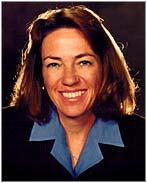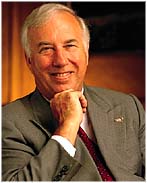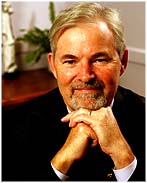REDMOND, Wash., July 17, 2006 — This week Microsoft Research’s External Research and Programs group is holding its annual Faculty Summit at the Microsoft Conference Center on the Redmond campus. More than 350 academic leaders representing 175 institutions are in attendance.
The 2006 Microsoft Research Faculty Summit is intended to pick up where last year’s summit left off, by addressing the growing crisis in computer science education and its talent pipeline in the United States.
During today’s opening plenary session, an influential panel from academia, industry, women in computing, and government shared their understanding of this “gathering storm,” as the problem has been dubbed in a recent National Academy of Sciences paper. The plenary session will initiate a two-day dialogue about what is needed to ensure that a new generation of computing professionals will emerge to move the discipline forward.
Hosted by Richard Newton, dean of the College of Engineering and the Roy W. Carlson Professor of Engineering at the University of California, Berkeley, the panel included Dan Mote, president of the University of Maryland; Craig Mundie, Microsoft’s chief technical officer of advanced strategies and policy; Lucy Sanders, CEO and co-founder of the National Center for Women & Information Technology; and Richard Russell, associate director of the Office of Science and Technology Policy for the Executive Office of the President of the United States.
To get a better understanding of the issues being discussed this week, and the importance of bringing industry, academia and government together to solve them, PressPass sat down with some members of the plenary session panel, along with Sailesh Chutani, director and founder of the External Research and Programs group.
PressPass: What is Microsoft’s goal in hosting this annual faculty summit?
Chutani: We will look at the issues that have long-term consequences for the health of the academic ecosystem, and what the industry, academia and policy makers should be doing in response to those issues. As in our previous summits, we are also looking to stimulate collaboration between researchers in Microsoft and our academic partners.
PressPass: what do you see as the pressing issues facing technology and science in the U.S. today?

Lucy Sanders, CEO and co-founder of the National Center for Women & Information Technology
Sanders: I think the most serious issue for computer science specifically is the declining number of great students that we have coming into the discipline today. If you look at the 2005 college board statistics, the mean math SAT score for incoming computer science students is actually lower than the mean math SAT score for English literature students. It’s one of the lowest of all the disciplines. I think this indicates that we are not necessarily seeing the best and brightest students coming into the computing discipline right now, and we need to take a look at how to fix that.
Newton: While the number of students applying for pure computer science is decreasing, the number who are actively and aggressively using computers in their curricula — in the areas of mechanical engineering, electrical engineering, bioengineering and the sciences — is growing. I ask myself if this a crisis for computer science or a transformation?
We need to understand that in virtually every discipline today, from the humanities to the sciences and engineering, information and communication technology has become central to progress – from applications to the development of new ideas, new algorithms and new techniques for computing.
Chutani: We know that there are three very important trends, and these trends haven’t yet played out completely — research and development funding has dropped, enrollments have dropped, and there are lots of restrictions that are making it difficult for foreign students to come to this country. These trends have come on the heels of fairly significant growth in the size of the departments of computer science during the dot-com era. This situation is not sustainable and some changes would need to happen before we find a new equilibrium.
Currently the U.S. still has the broadest, the deepest and the most wonderful higher education system, but it’s not something that we can take for granted in the long term. The policies that we are following here in the U.S. today are encouraging more and more foreign students to go to Europe and elsewhere to pursue higher education. This loss of foreign talent will impact our ability to compete in a global knowledge economy.

Dan Mote, President of the University of Maryland
Mote: There is no question that we are in a transformation nationally in terms of science and technology. We are in fact in a new world, and it’s important for all of us to see that this is a different environment we’re working in. We don’t have national companies anymore. We have global companies, and the opportunities to work for these companies are global now too, as people know well. We have to think of the implications of the fact that the traditional “unspoken agreement” between industry and government to help build American jobs and prosperity has shifted, because now we have global companies and global economic employment opportunities rather than purely American economic and employment opportunities. And it’s changing very rapidly. We all have to be concerned about it.
PressPass: What are some changes that need to occur to keep the U.S. competitive in technology and science? How do we attain that new equilibrium?
Chutani: The industry, academia and policy makers need to come together and push hard to address the necessary issues. The crisis has already forced one positive development. The faculty and academia are figuring out ways to compete for the best students. They are asking some hard questions about relevance, about pedagogy and curriculum, and really evaluating what it is they want to communicate and accomplish in their classes and programs. This re-examination will have very interesting long-term consequences. The curriculum will come out stronger and the programs will come out stronger and far more competitive.
Sanders: One of the biggest things we all need to do as computer scientists is become activists. We’ve been inactive for too long in this discipline. We need to spend the time, the energy, the passion, to show the commitment it takes to recruit more students, to support the students as we are educating them, to re-energize our curriculum, to really understand that it takes more than just a simple solution. It’s going to take a lot of time and energy by the people who are coming to this summit.
Within every university the solution is going to be different. It will be different in terms of recruiting, different in terms of how they want to teach, what kinds of research they want to push, but the one ingredient that’s really the same is that we need computer scientists to jump in and become activists in support of the discipline.

Richard Newton, Dean of the College of Engineering and the Roy W. Carlson Professor of Engineering at the University of California, Berkeley
Newton: No matter what your politics are, when the President of the United States says in his State of the Union address that this is an important topic— this investment in science and engineering education and the consequences of that for investments in new industries — that is profound. It really affects people, and it creates an opportunity to act.
This panel and this faculty summit need to be about that opportunity. These moments don’t last forever. The opportunity we have and what we are talking about this week is that industry has acted relatively independently up to this point in the way it’s lobbied for these kinds of issues. Academia has invested in its own lobbying and efforts to bring attention to these matters. The real value is going to come if we can put together a coherent strategy that involves all of the constituencies.
Mote: In order for our nation to succeed, we need to be able to develop high-paying jobs for well-trained Americans, so we can compete on this world scale, whether that’s in computer science or other fields. I think we need to think forward as computer scientists, members of academia, industry and government, about how we’re going build such an opportunity for our citizens, and we have to work together to create a circumstance where that’s going to happen.
PressPass: Why is it so important for industry and academia to work together in influencing education policy?
Newton: When Microsoft goes to Washington, the first reaction is that it’s coming from some kind of vested industry perspective. But if Microsoft goes with leading academics and university leaders then clearly the credibility of the collective is much greater, because the involvement of universities legitimizes these efforts.
On the other hand, if university leaders show up in Washington and say something is important and there’s no industry to back them, frankly, the first reaction is that they’re looking for money. They can be as profound as they want as university leaders, but unless there’s someone from industry nodding their heads, they don’t get the credibility they need.
Working together with industry leaders such as Microsoft brings credibility for the universities. Microsoft also brings in other industry partners to help us pull together a consortium. It has a tremendous impact.
PressPass: What else do academia and industry gain from the kind of collaborative dialogue we’re seeing at the Faculty Summit this week?
Chutani: From the point of the industry, what can we bring to the table? We can bring the perspective of the real-world problems, and that can be helpful to someone who is trying to scope out a research agenda. The industry can also bring to bear tools, software and hardware, financial resources and the possibility of collaboration. In addition, the industry can lend its voice to issues that impact both industry and academia.
From the point of view of academics, what do they bring? Academics are professional thinkers and educators, and that is extremely valuable for the industry to tap into. Academia is also a great source of innovation. As companies move to a more open innovation model of creating new products and technologies, the role and importance of innovation originating in academia will only increase.
Sanders: The innovation ecosystem in this country is comprised of universities and the research labs in corporations, and there is a lot we don’t understand about the intersection points between those types of institutions. But we know that when they’re working well together, like in the Silicon Valley or the Boston Corridor, we have very good examples of innovation cauldrons in this country that really work to keep the country globally competitive. So one of the things that Microsoft brings to the table is facilitating those conversations at events such as this Faculty Summit, and being a role model nationally for understanding that these intersection points are important and exploring how we can work together.




